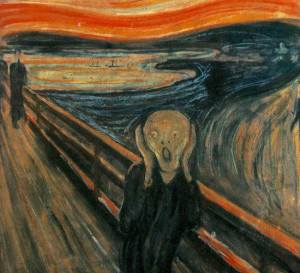



According to the referential frame of Cartesian rationality, does the madman think? If one admits that the madman does not think according to the standard of cogito, ergo sum — I think, therefore I am, perhaps this might translate into consequences in his exercise of citizenship. For instance, his social and political invisibility, the negation of the right of recognition due to the overvaluing of reason by René Descartes.
This text will confront the psychiatric and psychotherapeutic concepts of the madman and the Cartesian defense of the process of thought as an a priori condition for existence. The madman is here categorized as one who loses the notion of reality as a consequence of mental disturbances originating from multiple factors.
The contribution of Descartes in the history of thought allowed for a radical change of paradigm: from Middle Ages to modernity. From God as a starting point and referential of creativity to man as center of reality, translated into the philosophy of subject. The corollary of Cartesian philosophy is not reduced to the previous categories. It has influenced several western thinkers.
These are the consequences of the overvaluing of the gnoseological statement as a starting point to the edification of his philosophy. We intend to identify and understand another consequence: the negation of the humanity of the madman, of his existence, and consequentially of his exercising of citizenship, about which there seems to be no literature.
The nullity of the madman as a person and as a political / social entity can be confirmed by the following Cartesian reasoning: “[…] If I had stopped thinking, even though all other objects I once had imagined actually existed, there would had been no reason to believe I exist”, that is, all that thinks is or exists. The existence of corporeity (res extensa), or the whole man, presupposes res cogitans.
Although there may be an epistemological backbone of mind sciences that demonstrated that, in spite his state of madness, an individual thinks or has a minimum of rationality, it nevertheless seems that this reasonability does not answer the demands of permanent methodical doubt; the rules of method as correct expression of one who conducts his spiritual faculties with lucidity and mastery.
Having Descartes’ statement as a background, according to which a human being is what he thinks, without thinking man is not. This statement raises the following issues: does a madman doubt according to the demands of Cartesian thought? Is the madman aware of himself? The only certainty from which one can build arguments is the cogito. Does the madman possess this certainty? Is the madman able to impose rules on himself for the proper conduction of his thinking activity? Or yet, is he able to submit himself to the four rules of the method? If the answers to these questions are negative, this will allow us to understand why society treats the madman in a negative or indifferent manner. Negative answers nullify the madman in Descartes’ framework, which would mean that he does not think, therefore he does not exist, and therefore he cannot be the subject of any human action.
What the present article aims to understand, and it seems relevant, is the relation between the madman and his citizenship. The citizenship in which we intend to integrate the madman is the one postulated and theorized by the liberal school, in its strait relation with jusnaturalism.


Russell comments that the Cartesian conception of the process of thought is quite broad. That is why this project assumes that this structure of thought does not include the madman. Here the madman is on the margin, does not exist, as Descartes himself seems to suggest: “Why is cogito so evident? I have concluded that it is because it is clear and distinct. […]. True is all that we conceive very clear and distinctly”. Can the madman use his reason in the frame where all is clear, distinct, passible of being object of doubt, understood, negated, affirmed, conceived, imagined and felt?
If there is thinking that is able to demonstrate that the reasoning of the madman finds no shelter in the Cartesian scheme of thought process, then perhaps this philosophy of the subject is really a key factor in the situation into which society puts the madman in our days: in invisibility, in isolation, in definite negation of his being.
In face of this hypothetical frame into which Descartes, as a consequence of his thought, has put the madman, it seems that the jusnaturalistic principle of Kant — according to which man is an end on itself, regardless of the accidents he might carry along his personal history — might contribute to rescuing the citizenship of the madman, with all of the consequences which derive from this general category: personal identity, recognition, right to integration, humanized treatment.
It seems that Cartesianism has put the madman in this condition of non-being because the reason it postulates is mathematical, it is for what is effective and useful. According to the categories of efficacy and usefulness as they are conceived, no contribution can be expected from the madman. Nevertheless, an approach from another perspective can help understand the importance of those who have lost the notion of reality due to mental disorder. The madman is important. Were he not, I would not know that I am not mad.






